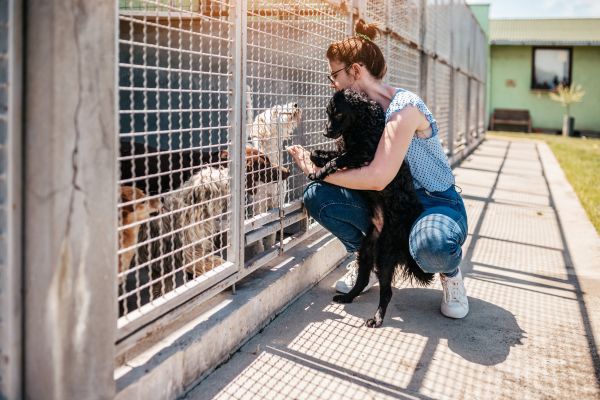In the fascinating universe of animal behavior, understanding the personalities and behavioral patterns of our beloved dogs is essential. In this article, we will delve into the psychology of the animal kingdom, unraveling the mysteries behind every bark, wagging tail, and expressive gaze. Get ready to learn more about the canine mind and how it can influence the training process.
Discovering the Behavioral Complexities of Dogs

Dogs, our loyal companions, have personalities as diverse as those of humans. Each breed, each individual, carries unique traits that shape their interactions with us and the environment around them. Understanding these nuances is crucial for establishing a harmonious and effective relationship between human and animal. As we delve into the realm of animal psychology, we are confronted with the richness of emotions and behaviors that make our four-legged friends so special.
In the context of dog training, grasping the principles of Animal Kingdom Psychology is paramount. The method of positive reinforcement, rooted in encouragement and reward, emerges as a potent strategy for shaping canine behavior ethically and effectively. Rather than enforcing control through fear or coercion, we opt for cultivating a bond of trust and cooperation. Within this framework of respect and comprehension, dogs are empowered to unveil their authentic essence and realize their full potential.
Each training session is an opportunity to dive deeper into the inner world of our faithful friend. By observing their reactions, preferences, and responses to different stimuli, we unravel the mysteries of the canine mind. Each bark, each movement, each facial expression carries valuable clues about their needs, desires, and limitations. By becoming true students of animal behavior, we open doors to a deeper and more meaningful connection with our furry friends.
Exploring the Emotional Bonds between Humans and Dogs

The emotional bonds between humans and dogs transcend the mere relationship of owner and pet. They are bonds of loyalty, affection, and mutual understanding that enrich our lives in countless ways. Animal Kingdom Psychology offers us a lens through which we can examine and better understand these deep bonds, enhancing our connection with our canine companions.
By embracing a positive reinforcement approach, we not only enhance the desired behavior of the dog but also foster a deeper connection with it. The mutual trust cultivated throughout the training journey forms the bedrock of a strong and harmonious partnership, rooted in insights from Animal Kingdom Psychology. It represents an ongoing exchange of knowledge and development, benefiting both parties involved.
Observing the unique personality of each dog is an exciting and rewarding journey. Some are outgoing and playful, while others are more reserved and observant. Adapting our training techniques to meet the individual needs of each animal is essential for achieving positive results. It is a process that requires patience, empathy, and a deep respect for the uniqueness of each being.
By integrating an understanding of animal psychology into our interactions with our dogs, we enrich not only their lives but also our own. It is a journey of mutual discovery and continuous growth, where each new insight brings us closer to understanding the complexity of the canine mind.
Connecting with Your Dog: The Importance of Nonverbal Communication
Nonverbal communication plays a fundamental role in the interaction between humans and dogs. Our furry friends are masters at reading our facial expressions, body language, and tone of voice, responding based on the cues they receive. By learning to interpret and effectively use these signals, we strengthen the emotional bond and mutual understanding between us and our dogs.
During the training process, it is essential to clearly communicate our intentions and expectations to our dogs. This can be achieved through simple gestures, such as using body language to indicate a command or rewarding desired behavior with affection and praise. By communicating consistently and positively, we establish a solid foundation for the dog’s learning and development.
In addition to understanding human body language, it is equally important to learn to read the signals that our dogs send us. From an expectant look to a relaxing yawn, our furry friends are constantly giving us feedback about their emotional state and level of comfort. By paying attention to these signals, we can adjust our training approach to ensure that our dogs feel safe, confident, and motivated, drawing from insights in Animal Kingdom Psychology.
The connection we share with our dogs goes beyond words. It is a subtle dance of gestures, expressions, and emotions that unites us in an unbreakable bond of love and mutual understanding. By honoring this connection and cultivating authentic and respectful communication, we enrich not only the lives of our dogs but also our own.
Unraveling the Mysteries of Canine Intelligence
The intelligence of dogs has fascinated and intrigued humans for centuries, from ancient shepherds relying on their loyal companions to guide flocks, to modern trainers harnessing dogs’ potential across various fields. This enduring admiration for canine intelligence continues to captivate us.
Understanding our dogs’ minds enables us to create enriching learning environments that maximize their potential. This involves acknowledging and appreciating each dog’s unique abilities, providing challenges suited to their skill level, and encouraging ongoing development.
Positive reinforcement emerges as a particularly effective method in fostering canine intelligence. By rewarding desired behaviors rather than punishing mistakes, we encourage dogs to explore, learn, and flourish. This approach values the learning process and cultivates a relationship of trust and respect between human and animal.
Exploring the mysteries of canine intelligence serves as a constant reminder of our dogs’ remarkable adaptability and learning capabilities. Each new achievement and challenge conquered is a moment of celebration and inspiration. It’s a journey of mutual discovery and growth that deepens our appreciation for the wonderful complexity of the canine mind.
Nurturing Your Dog’s Well-Being: Essential Care

The well-being of our dog is a fundamental priority for any responsible owner. In addition to offering love, attention, and adequate physical care, it is also important to meet the emotional and mental needs of our faithful companion. In this section, we will explore some essential aspects to ensure the happiness and comfort of your dog.
Maintaining a regular exercise routine is crucial for the physical and emotional well-being of your dog. Daily walks, play sessions, and interactive activities not only help keep your dog healthy and fit but also provide mental stimulation and socialization opportunities. Additionally, regular exercise can help prevent behavioral problems related to lack of stimulation and accumulated energy.
A balanced and nutritious diet is essential for your dog’s health. Choose high-quality foods formulated to meet your dog’s specific needs in terms of age, size, and activity level. Avoid processed foods, rich in additives and artificial ingredients, and opt for natural and nutritious options that promote the long-term health and vitality of your dog.
In addition to caring for the physical needs of your dog, it is also important to meet its emotional needs. Dedicate time to play, interact, and relax with your dog every day. Create a calm and peaceful environment at home, where your dog feels safe and comfortable. The attention and affection you offer your dog are essential to strengthen the bond between you and promote a sense of security and happiness.
Exploring New Frontiers: The Future of Canine Learning

Looking to the future, advancements in canine learning offer exciting possibilities with new techniques, technologies, and approaches. These innovations aim to enhance communication and strengthen the bond between humans and dogs.
Technology will play a significant role, providing tools like interactive apps and behavior monitoring devices to aid in training and understanding dog behavior.
There’s also a growing emphasis on holistic well-being, including a dog’s physical, emotional, and social health in training programs.
However, amidst these advancements, it’s crucial to remember that at the heart of human-dog interaction lies the bond between them. Love, patience, and dedication remain essential in enriching both our lives and those of our furry companions. Let’s welcome the future with enthusiasm and a commitment to deepening our connection with our dogs in meaningful ways, guided by insights from Animal Kingdom Psychology.
Conclusion: Unraveling the Mysteries of the Canine Mind
Throughout this article, we’ve explored the complexities of animal psychology, focusing on our beloved dogs’ behavior. From the importance of positive reinforcement to understanding nonverbal cues, each aspect has deepened our understanding of our furry friends.
It’s vital to remember that dogs have individual needs and personalities. By fostering mutual understanding and respect, we strengthen our bonds with them, nurturing relationships based on love and trust.
In a world of constant change, prioritizing our dogs’ well-being is paramount. May this article inspire dog owners to continually learn, love, and connect with their four-legged companions.
Whatever path we choose to follow with our dogs, may it always be permeated with affection, understanding, and gratitude. Because, at the end of the day, there is no greater reward than the unwavering love of a dog.